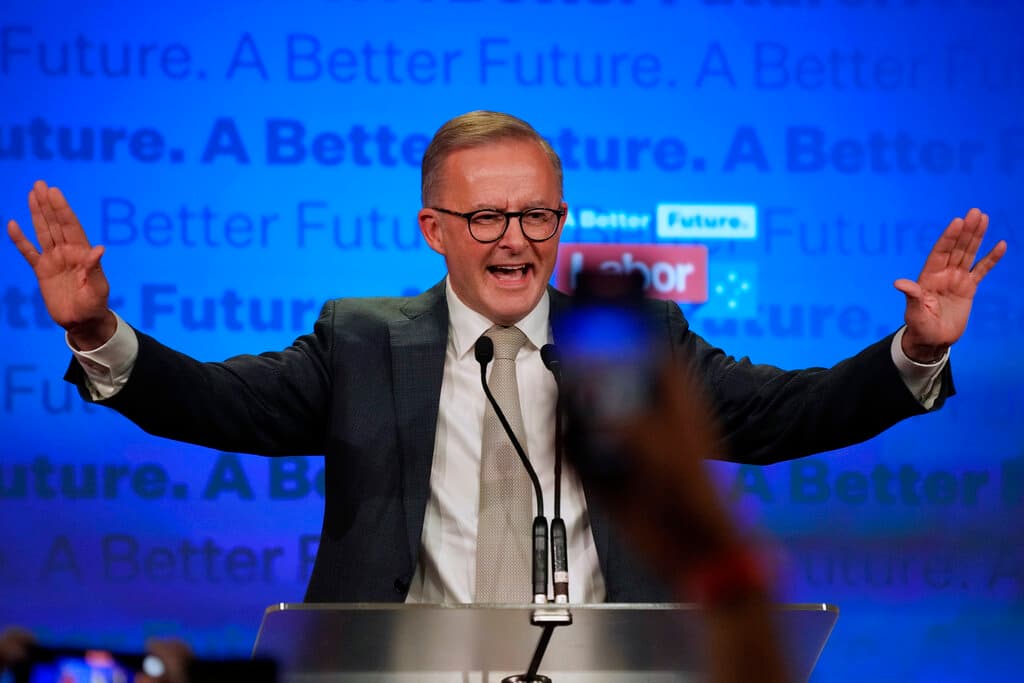Australia Vote Spells Big Trouble in Respect of Foreign Policy, as the Greens Test Their Power
Over the six-year life of the previous Labor government, the Australian defense budget plunged to a mere 1.64 percent of GDP.

The victory of Australia’s Labor Party in the elections Saturday might have been by the slimmest of margins — three seats in the House of Representatives — but it spells big trouble in respect of foreign policy.
Like all Labor prime ministers before him, Anthony Albanese, who will accede to the leadership, talks a good game. He avows support for the Australia and New Zealand alliance with the United States. Pressure from the leftist Greens, though, combined with Labor’s institutional DNA, does not portend well.
The ALP was established as the political arm of the Australian trade union movement. Like social democratic parties throughout the Western world, Labor tends to view social programs like health and education as a higher fiscal priority as opposed to military spending.
Over the six-year life of the previous Labor government, from 2007 to 2013, the Australian defense budget declined to a mere 1.64 percent of GDP, as opposed to 2.08 percent under the Liberal-National Coalition. With those figures, it’s no surprise that not a single Royal Australian Navy combat vessel was commissioned under Labor.
Then there are the Greens, who will surely exert political leverage commensurate with their enhanced strength in the Senate. And with Labor winning only 25 Senate seats – a dozen short of the 37 required for a majority – Mr. Albanese will require those 12 Greens votes to pass contested legislation through parliament’s upper house.
So what are the Greens likely to demand? Their priorities will likely focus on issues of social welfare policy and the environment that are dear to progressive hearts. Reducing CO2 emissions by 75 percent over the next eight years is a central plank of the Greens’ policy platform.
Add to that a suite of budget-busting expenditure programs that would ravage Australia’s national credit rating and crush the private sector. On national security, the Greens’ “Peace, Disarmament and Demilitarisation” policy seeks a radical reduction in Australia’s defense budget that would shrink its military to little more than a lightly armed constabulary.
In true kumbaya fashion, the Greens declare that “investment in offensive military capabilities, undermines the environmental sustainability and social development necessary for global cooperation and peaceful non-violent conflict resolution.” On foreign policy, the Greens are just as bad.
Like their hard-leftist peers throughout the West, they are hostile to America and passionately anti-Zionist. Speaking in parliament, the Greens’ leader, Adam Bandt, advocated for a Palestinian “right of return” that would negate Israel’s existence as nation of the Jewish people and transform it into another failed Arab state.
Mr. Bandt also seeks to end the rotational deployment of 2,500 Marines to a training area near Darwin in the Northern Territory and withdraw from the Australian-American alliance. That would represent a major setback for advocates of a strong defense at a time when Communist China is maneuvering in the Pacific.
Australia faces many of the same economic challenges now confronting America, including rising inflation, supply chain problems, and a budget deficit. Like the Biden administration, the Albanese government would be under internal pressure to adopt policies that will worsen that situation.
Labor’s trade union base is already voicing demands for pay rises and punitive anti-business legislation. This would only enhance the ALP’s predisposition to slash defense spending for the sake of funding its domestic agenda.
If past is prologue, the wheel of Australian democracy will eventually turn, and one day Labor will be turfed out of power after making a mess of things, as they always do. The only real question is how much damage an Albanese government will inflict on Australia in the meantime.

